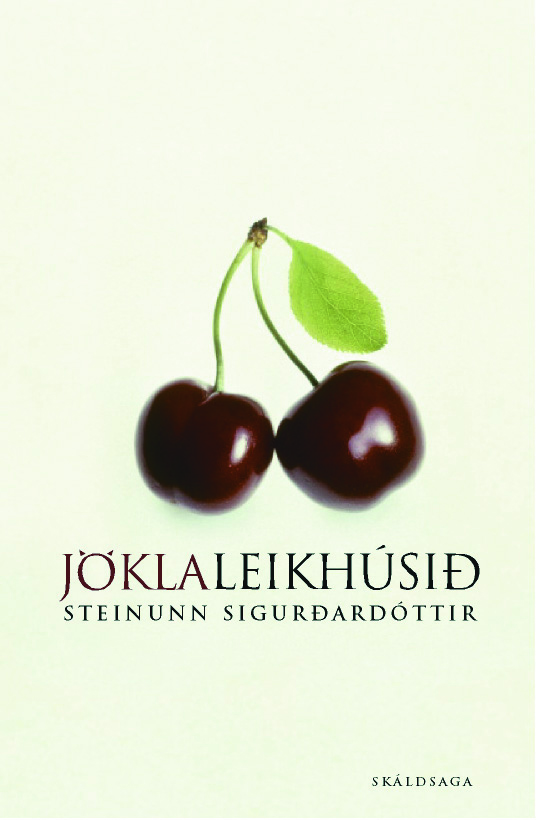
- Genre: Fiction
- Year: 2001
- Sold to:
- Finland (Otava)
- Sweden (Wahlström & Widstrand)
- Denmark (Gyldendal)
- Germany (Rowohlt)

An amateur drama group in a small village decides to undertake a production of Anton Chekhov’s Cherry Orchard, in which all the parts are to be played by men. When the local community leader learns of this innovative project, things really start to happen. He is so inspired by the idea that he decides to build a whole theatre for the production – The Glacier Theatre. This leads to a course of events that is hilarious, grotesque and outrageous – but the hearts of the villagers are filled with more since sincere passions – true tragedy and desire, and are changed forever.
REVIEWS
“Entertainment at a very high level.”
Neue Züricher Zeitung
“This is an exceptionally well written book. … The style is masterful, full of original ideas and humour. A sparkling, lively novel.”
Television programme Kastljós, Icelandic National Broadcasting
“The story ends at just the right moment: the climax. Steinunn Sigurdardottir’s Glacier Theatre is a sort of tragic farce (not unlike a Chekhov play), or as the story itself puts it: “a painfully sweet wonder, where the comic and tragic are brother and sister on a teeter-totter” (31). A splendid story in a splendid book jacket.”
Morgunbladid daily newspaper
“The structure of the story is unusual in that it is built up around a theatrical stage. The life that appears at rehearsal is reflected in everyday life, and vice versa, and hence the author brings together two literary fields in an original manner. At the same time, it is made clear that all the world’s a kind of stage. The duration of the story is about three years, but because events happen so fast time becomes relative, with the concomitant passion, jealousy, adultery, alcoholism, violence, misunderstanding, joy and sorrow. As in life itself – or in a good farce. And The Glacier Theatre is just that.”
Sigridur Albertsdottir, DV newspaper
“A truly fun book. And a good book in the best sense of that word. And often really beautiful … If I were to compare this book to another work of art I could think of no better comparison than a painting by Chagall, perhaps one of his more tranquil works: colourful, beautiful and sincere, with something unexpected concealed behind a door or a wall. Not unlike Sigurðardóttir’s writing. It runs smoothly, and flows with the ease of a stream. It is as fun to read it as it is to throw a stick into a stream and watch it flow down from the mountain to the sea. This reader has very little tolerance for poor, cumbersome, artificial or meaningless sentences, and is happy to report that there are no such sentences in The Glacier Theatre. On the contrary, there are several that naturally leap off the page and will remain embedded in the reader’s memory…
… There are no blacks or greys in this book, in spite of the torment these colours may stir in the souls of some of its characters, and even though there is no shortage of events that some might interpret in coal-black horror. Steinunn paints on, using the same colours, vivid and pure, particularly blue I found. As the story evolves, various shades emerge and, to the immense relief of the reader, we come to realise that in order to paint a portrait of an individual with all his good and bad traits, you don’t have to use grey or black; blue can be quite sufficient. Whenever sorrow raises its head, for example, it is just as true in Sigurðardóttir ‘s shades of blue as it would be in the more obvious shades of black, in the same way that even Chagall’s most cheerful paintings reflect the entire spectrum of human emotion.
The Glacier Theatre naturally also bears some relation to The Cherry Orchard and, as the book reminds us, the playwright described his play as a “comedy”. The Glacier Theatre is like a Chekov play: full of humour, warmth, affection and respect for humankind—so funny it can be called a comedy, although other levels may be discovered on a closer reading. It is in the blueness of this book that life is to be found.”
Illugi Jokulsson, strik.is

(b.1950) is one of Iceland´s most highly acclaimed novelists and poets and has sustained a writing career since 1969, as well as a distinguished career in journalism. Her first novel, The Thief of Time, was made into a French feature
More about the author